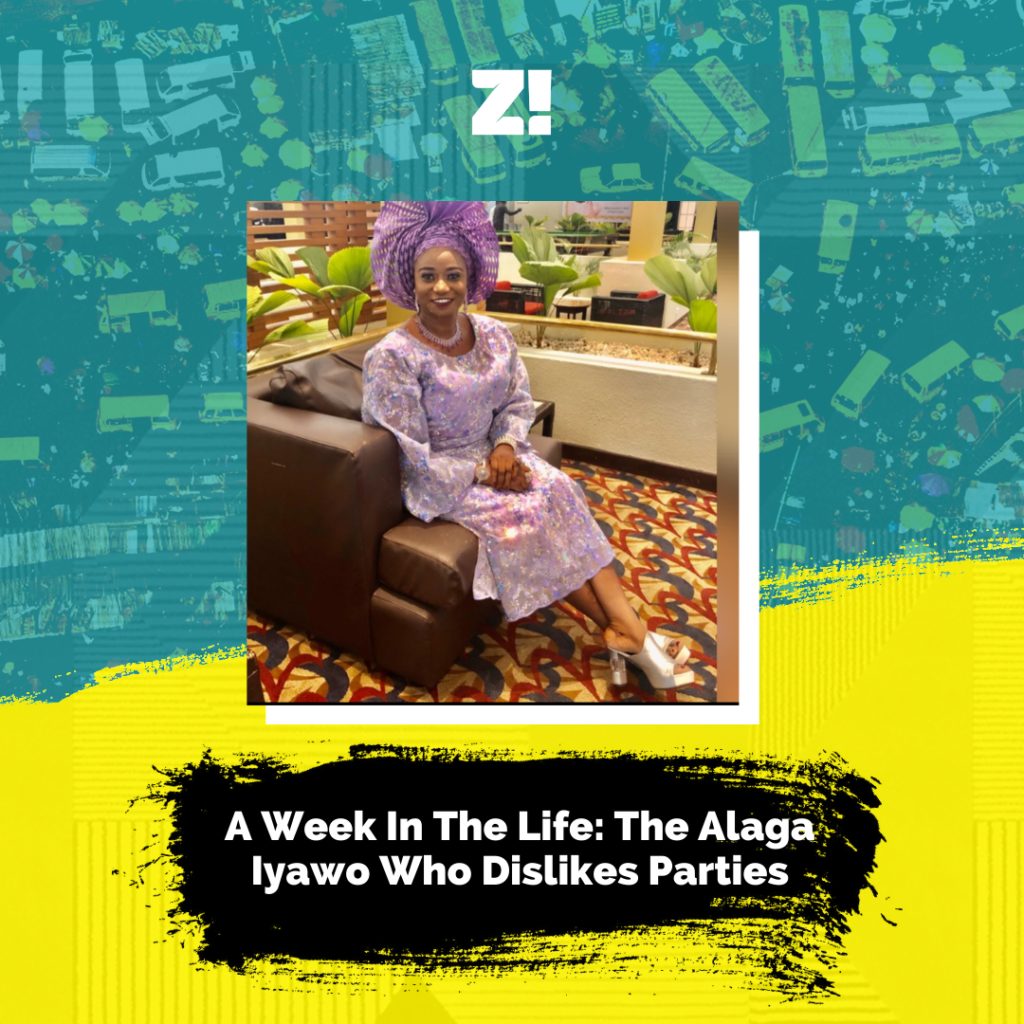A Week In The Life is a weekly Zikoko series that explores the working-class struggles of Nigerians. It captures the very spirit of what it means to hustle in Nigeria and puts you in the shoes of the subject for a week.
The subject of today’s “A Week In The Life” is an Alaga Iyawo. These are women who host Yoruba wedding ceremonies, sing songs of praises, double as MC’s and serve a host of other functions. She talks to us about not liking parties even though her job revolves around them, the challenges she faces in day to day life, and what a perfect retirement looks like for her.

MONDAY:
The first thing on my mind when I wake up today is that I’ve been an Alaga for weddings for close to 22 years. And that feels unreal. It feels like a lifetime ago when I stumbled into this job. Becoming an Alaga for me was by luck/chance because I didn’t go to school to learn neither was I trained; it just happened.
In those days, as a youth in church, we used to rally round to help members of the church getting married — planning, declaration, coordination and any other thing. It was during one of these moments my journey started. There was a particular sister we helped out with planning her wedding, and it is wasn’t until the day of the wedding that we knew we were supposed to get an Alaga. The only reason we even knew was because the groom’s family came with theirs. In the midst of all the confusion, all the other sister’s pushed me forward saying: “Sister Bisi, you can do it. You can talk very well.” I mean this was true; I was an interpreter in church, I sang in the choir, and I was also a teacher in the children department, but the fact remained that I had never done something like that before. As if it was ordained by God, I now wore one very fine cloth that day. Grudgingly, I stepped up to represent the bride, and that was the beginning of my journey. It wasn’t perfect and I’m thankful I had help from someone who guided me on what to do and say. I was also lucky that it was a small church event, so we just said opening prayer, praise the Lord, let the bride come in, let the groom come in and we were done.
However, my second time on the job was intentional. After witnessing my performance, one of the sisters in church said she was not going to pay what the professionals were asking for, and I had to be her own Alaga. Her argument was since I had done it for someone else, I could also do hers. I told her I was scared and that event was impromptu but all she told me was to go and prepare. Because I was unmarried at the time, I spent a lot of hours watching videos from my sister’s wedding to learn the mannerisms, songs, routines etc. Thankfully, I pulled it off. After the success of the second wedding, I officially became the church’s Alaga. Couples would come in for marriage counselling and the church would provide options for them to save money, part of which usually involved my services.
That’s how I began full time with no prior training or anything. God just showed me that this is a calling, and ever since then, I’ve been able to train at least over 120 people who are doing well. That alone is enough reason for me to get out of bed every morning.
TUESDAY:
One question people ask me is “What do we do with all the money we collect at weddings?” I try to break it down for them. Firstly, the money is for the family. We share the proceeds into like thirteen envelopes which are then distributed to the family members on the paternal and maternal side. The money is a token to appreciate people who took off time to attend the wedding. It’s not as if the money will change their lives, because some people get as low as ₦200 or ₦500, but it’s for them to say that during so and so wedding, they went home with something.
We also collect specific money like money for unveiling the bride, which goes to the bride. There’s money for reading letter which goes to the person who reads the letter the couple writes to each other. We also have “aeroplane” money for people who bring in the wife to the venue.
I make my own money from being sprayed during the programme. Or after the groomsmen finish prostrating to both families, I ask them to bless me with anything they have. The reason why it seems like some of my colleagues charge a lot of money from the groomsmen and bridesmaid is that they probably collected a cheap amount for their services. Parents usually boast about the calibre of people coming to the wedding to make sure we don’t charge a lot. In cases like that, the Alaga has to make up for the difference in fees. That means that everyone present at that ceremony will pay through their nose. I charge a fixed fee before the wedding, and that’s why I don’t collect money more than once at the venue, and I remit the money for the family to the family.
There’s a class of people called “no bowl show”, where the family instructs us not to collect any money at the venue. In cases like that, we charge them two times the fee.
WEDNESDAY:
Every job has challenges, and my own is not an exception. Sometimes, the other side [bride or groom] might also have their own Alaga, and the person is trying to show off their talents or skills while you’re working on a fixed time, and that can be frustrating. It can cause a lot of issues when both of you are not the same page. You just have to pray to meet someone who is understanding.
Also, Nigerians do not keep to time. Sometimes they know an event won’t start till 2 p.m., but they’ll tell you to come by 8 or 10 a.m. So I end up spending time I could have used on other productive things waiting for the event to start. I went for an event on December 24th that was supposed to start by 8 a.m. In my head, plus Nigerian time, we’d start at 10 a.m. and be done by latest 2 p.m — I’d still have ample time to get home and make Christmas plans for my family. This event didn’t start until some minutes before 1 p.m. When I wanted to introduce the groom, I was told that he was stuck in traffic. Thank God I went along with one of my colleagues that day because after waiting for a few minutes and no show, I just picked up my car and left the venue. My colleague was the one who anchored the rest of the event.
Another issue that is now “normal” is men making advances at me during this work. It’s always annoying when some father of the groom or bride makes advances at me because most times, I get close to the mother of the bride or groom first. Imagine talking to someone for months and planning a wedding with them; there’s a form of friendship that occurs from spending a lot of time together. Then suddenly on the day of the event, her husband is making a move on you. It’s very somehow. I just chalk it up to men’s nature, ignore and face my work. I know my worth, and I know what the men are doing is all noise.
THURSDAY:
A good Alaga must have a very good dress sense. They must also smell nice, look nice and have a good voice. They should be able to coordinate themselves. If you can’t control your temper you can’t do this work. Mostly because people will step on your toes intentionally or unintentionally. To succeed in this job, you also need to learn time management — don’t waste people’s time and make sure you finish early enough for the family to entertain their guests. These are the things any exceptional Alaga must know.
I’m always training people. In fact, I’m starting another training in February. Today, I’m counting the number of students who have enrolled for the class, and ten slots have been filled out the twenty I planned for. I’m glad that people are interested in learning about this job. It’s very lucrative to use your voice and talent to make money. All you have to do is transport yourself to the venue and you’re good. I call my tribe the “Exceptional Alagas” because we train them on how to sing, coordinate events and not be greedy. The beauty is that the training happens over WhatsApp, so it accommodates my busy schedule. After the online class, we have an internship period where people shadow professionals for six months to a year. I’m always excited to pass on knowledge to the younger generation.
FRIDAY:
Without my husband, I wouldn’t be anything at all and I’m not even joking. If I didn’t marry him, I don’t see any man who could have married me. Because of how demanding my job is, it’s not easy combining it with family duties. But my husband is so understanding. In fact, he’s unique. In addition to my Alaga work, I also run a jewellery and Aso-Oke store, and my office is quite a distance from my house. What this means is that I leave the house from Monday, and I don’t return home until Saturday. My husband holds down the house until I’m back. It helps that I have grown-up children and always make arrangements before leaving the house, but there’s just something about a man who supports your career no matter what you choose. My husband and I both started our careers as teachers until I decided to pursue this work full time. When I told him, he agreed. And ever since then his okay has been okay. I don’t know how many men can do that for a woman.
SATURDAY:
I have an event today, so I’m up early to prepare. People ask me how I’m always in the mood to perform my duties. Maybe because they think it requires so much energy. I tell them that there’s no dull moment as long as it’s work. The only thing is that I don’t party outside of work. If I’m not with the mic at an event, it’s rare to catch me attending a party. I get fed up and pissed easily at parties. Even when I’m working, once I’m done with my duties, I’m out. I always want to retreat into my shell and go to either my house or the office.
I know I can’t do this job forever and that’s why I’m planning for retirement. All these other businesses [Aso-Oke] are my retirement plan, God willing. When I look back at my life, I see that God has been able to do what us men can’t do through this job. At least I can say that through this job we’ve gotten houses, we’ve gotten cars, we’ve started a business and we’ve trained our children. I want to retire by the time I turn 60, 65. At least by then, my kids will have given me grandchildren. At that point, all I want to do is focus on my family.
Check back every Tuesday by 9 am for more “A Week In The Life ” goodness, and if you would like to be featured or you know anyone who fits the profile, fill this form.
COMPONENT NOT FOUND: donation



